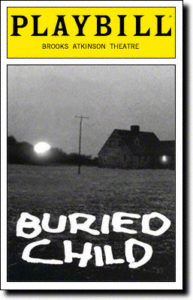MUCH of the world was taken by surprise by the death of playwright and actor Sam Shepard, who was felled (like Charles Mingus, a jazz artist who he was in some ways simpatico) ALS. To me, it was a bit like the sudden departure of Bowie and Prince.
But I must admit that while I knew vaguely that the actor I loved from The Right Stuff was a playwright, I did not know any of his work until the late side of college, when I read, all at once, his trilogy of incredible plays from the 1970s — rustic, Western, anti-naturalistic, surreal, and oddly logical, all at once — Buried Child, True West, and (perhaps my favorite) The Curse of the Starving Class.
These plays were, of course, written to be performed, but there was something direct and alive in reading them on the page. Even in a class that offered Chekhov and Pinter, these pieces stood out. (I think I tried and failed to work a line from Curse into my book Culture Crash which deals, of course, with issues of class.)
And as hard as these hit me at age 20, I don’t think I knew at the time of his connections to Bob Dylan and Patti Smith and other major figures in the American avant-garde. (“A play’s like music,” Shepard said, “ephemeral, elusive, appearing and disappearing all the time.”)
In the years that followed I was lucky enough to see all three of these plays all at least once in either Baltimore, Pasadena (Shepard’s hometown) or Los Angeles. I also got to know some of the other plays, and his often hallucinogenic prose like the collection Cruising Paradise. (A free beer to anyone who can track down my Boston Phoenix review of that from the mid-90s.)
This appreciation by my friend and former LA Times colleague Charles McNulty is one of the best I’ve seen. He calls Shepard the greatest American playwright since Tennessee Williams, and says “has inspired more young talents in the last few decades than any other.”

